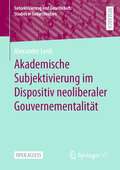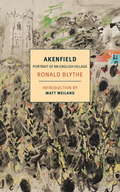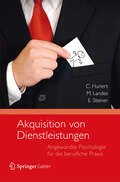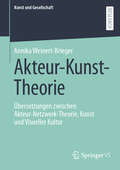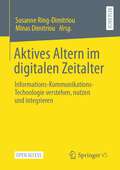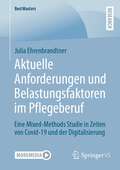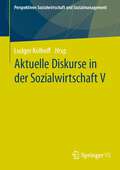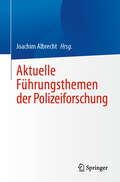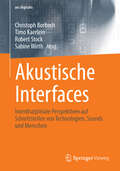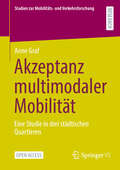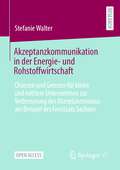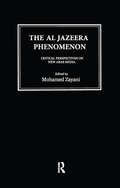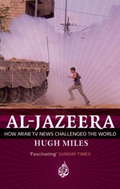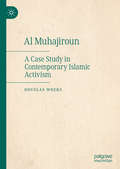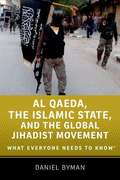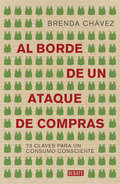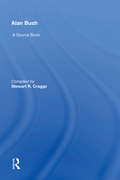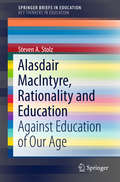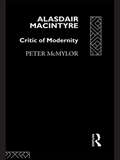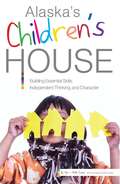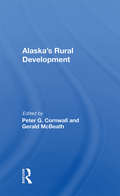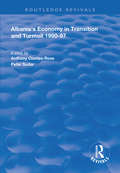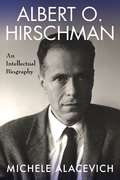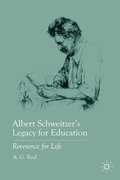- Table View
- List View
Akademische Subjektivierung im Dispositiv neoliberaler Gouvernementalität (Subjektivierung und Gesellschaft/Studies in Subjectivation)
by Alexander LenkIn diesem Open-Access Buch wird die Transformation von traditionellen zu unternehmerischen Hochschulen unter einer neoliberalen Wissens- und Identitätspolitik untersucht. Vor dem Hintergrund einer Ökonomisierung der Gesellschaft geraten deutsche Hochschulen und ihre Angehörigen ab den 1990er Jahren zunehmend unter Druck, sich unternehmerisch-manageriale Denk- und Handlungsweisen anzueignen, um den wissenschaftspolitischen Forderungen nach einer höheren Wettbewerbs- und Leistungsfähigkeit, einer Qualitätssteigerung sowie nach mehr Transparenz und Effizienz Rechnung zu tragen. Mithilfe der Forschungsperspektive der Soziologie des individuellen Widerstands werden die Subjektivierungsweisen von Wissenschaftler*innen mit den Subjektivierungsformen des Managementdiskurses kontrastiert und (Ent-)Subjektivierungsprozesse in der deutschen Hochschullandschaft rekonstruiert.
Akenfield
by Ronald Blythe Matt WeilandWoven from the words of the inhabitants of a small Suffolk village in the 1960s, Akenfield is a masterpiece of twentieth-century English literature, a scrupulously observed and deeply affecting portrait of a place and people and a now vanished way of life. Ronald Blythe's wonderful book raises enduring questions about the relations between memory and modernity, nature and human nature, silence and speech.
Akquisition von Dienstleistungen: Angewandte Psychologie für die berufliche Praxis
by Miriam Landes Eberhard Steiner Claus HunertErfolgreiche Verkäufer fühlen sich meist als "die Könige" des Unternehmens und dies meist mit gutem Recht, denn sie sind es, die an vorderster Front für den Erfolg des Unternehmens sorgen. Schwierig genug ist diese Aufgabe schon, wenn man ein konkretes Produkt verkaufen soll, aber das bietet wenigstens den Vorteil, dass es der Kunde im wahrsten Sinne des Wortes begreifen, es testen und auf seine Erwartungen hin überprüfen kann, bevor er seine Kaufentscheidung trifft. Die besondere Herausforderung im Verkauf von Dienstleistungen liegt darin, dass man auf der "Klaviatur" der verschiedenen psychologischen Befindlichkeiten, Erwartungen, aber auch Ängste und situativer Besonderheiten auf Seiten seines Kunden zu spielen vermag. Aufgrund angewandter psychologischen Erkenntnisse bietet dieses Werk die nötigen Einblicke für die Praxis. Auch stellt es diese Klaviatur erstmals in umfassender Weise vor und bietet darüber hinaus konkrete Handlungsempfehlungen für unterschiedliche Verkaufssituationen. Somit ist es wertvolle und zugleich ansprechend interessante Lektüre für alle, die aus beruflichen oder privaten Gründen mehr über die psychologischen Hintergründe von Akquise, Verkauf und Kaufentscheidungen erfahren möchten.
Akteur-Kunst-Theorie: Übersetzungen zwischen Akteur-Netzwerk-Theorie, Kunst und Visueller Kultur (Kunst und Gesellschaft)
by Annika Weinert-BriegerDurch die Akteur-Netzwerk-Theorie (ANT) ziehen sich seit ihren Anfängen zahlreiche Spuren einer intensiven Auseinandersetzung mit der Kunst und Visuellen Kultur. Annika Weinert-Brieger folgt diesen Spuren in ihrer Monografie erstmals systematisch durch die Schriften von Bruno Latour, John Law und Michel Callon, durch die von Latour kuratierten Ausstellungen und durch weitere Medien. Sie erschließt das umfangreiche Material in der international ersten Bestandsaufnahme zum Thema und kontextualisiert es kenntnisreich innerhalb bestehender Ansätze aus der Kunstgeschichte, -theorie und -soziologie. Damit gibt sie den Blick auf einen Arbeitsschwerpunkt eigenen Rangs innerhalb der ANT frei, der in ihrer Rezeption bislang einen blinden Fleck markierte. Im Anschluss entwickelt Weinert-Brieger die ANT zu einem eigenen kunsttheoretischen Zugang zu Kunstwerken, ihrer Produktion und Rezeption weiter. In einer Übersetzungsbewegung zwischen ANT und Kunsttheorie, die mit der jüngeren Theoriediskussion zum Verhältnis von Kunst und Handeln einsetzt, arbeitet sie die zentralen Elemente einer Akteur-Kunst-Theorie aus und zeigt deren Beiträge zu zeitgenössischen und historischen Theoriediskursen auf. Abschließend gibt die Autorin einen Ausblick auf theoretische und empirische Forschungspotentiale für die zukünftige Weiterarbeit mit den Ergebnissen der Bestandsaufnahme und mit der entwickelten Akteur-Kunst-Theorie.
Aktives Altern im digitalen Zeitalter: Informations-Kommunikations-Technologie verstehen, nutzen und integrieren
by Minas Dimitriou Susanne Ring-DimitriouAltersgerechte Assistenzsysteme leisten einen wichtigen Beitrag, die Lebensumgebung mit intelligenter Technik gesundheitsfördernder und selbstbestimmt zu gestalten. Diverse Sensoren, Geräte und Dienste (z.B. Sturzmeldesysteme, Exergames und Fitnessprogramme) sind heute verfügbar, jedoch steckt die Überprüfung der Wirksamkeit dieser Applikationen noch in den Kinderschuhen. Schlagworte wie „user-centered design“ hin zu einem „partizipatorischen Design“ beschreiben gerade den Umbruch, der in der App-Entwicklung vonstattengeht. Der vorliegende Open Access Sammelband enthält Ergebnisse aus empirischen Studien; aus der Sicht unterschiedlicher wissenschaftlicher Disziplinen wird das Thema erörtert.Dies ist ein Open-Access-Buch.Dies ist ein Open-Access-Buch.
Aktuelle Anforderungen und Belastungsfaktoren im Pflegeberuf: Eine Mixed-Methods Studie in Zeiten von Covid-19 und der Digitalisierung (BestMasters)
by Julia EhrenbrandtnerDer Pflegeberuf – ein Geben ohne Nehmen? Dieses Buch beschäftigt sich mit den Auswirkungen gesellschaftlicher Entwicklungen auf die Leistungsfähigkeit der Pflegekräfte in Österreich. Dabei liegt ein besonderer Fokus auf der Digitalisierung, Ökonomisierung und Akademisierung der Pflege sowie auf den Herausforderungen der aktuellen Corona-Krise. Dabei werden verschiedene Erklärungsansätze zur Wirkung von Arbeitsbelastungen auf die Gesundheit sowie insbesondere das Burnout-Modell von Maslach (1996) thematisiert. Basierend auf einer Mixed-Methods Studie in Kooperation mit der Paracelsus Medizinischen Privatuniversität (PMU) Salzburg wird die zentrale Fragestellung untersucht, inwieweit Persönlichkeitsmerkmale, technische und institutionelle Dynamiken sowie die Konfrontation mit der Corona-Krise die Leistungsfähigkeit der Pflegekräfte beeinflussen.Die AutorinJulia Ehrenbrandtner hat ihre Masterarbeit am Fachbereich Politikwissenschaft und Soziologie an der Kultur- und Gesellschaftswissenschaftlichen Fakultät der Paris Lodron Universität Salzburg zur Absolvierung des Masterstudiums Soziologie eingereicht. Der Forschungsschwerpunkt liegt auf der Arbeitssoziologie.
Aktuelle Diskurse in der Sozialwirtschaft V (Perspektiven Sozialwirtschaft und Sozialmanagement)
by Ludger KolhoffAktuelle zentrale Fragen der Sozialwirtschaft und des Sozialmanagements werden auch 2022 und 2023 auf Tagungen der in Deutschland Ton angebenden wissenschaftlichen Gesellschaft, der „Bundesarbeitsgemeinschaft Sozialmanagement / Sozialwirtschaft BAG SMSW“ diskutiert.Die vorliegende Publikation dokumentiert die Beiträge der Tagungen:· Sozialunternehmen im internationalen Vergleich (In Zusammenarbeit mit der Hochschule XXX)· Gender und Sozialwirtschaft (In Zusammenarbeit mit der Hochschule XXX)· Digitalisierung in der Sozialwirtschaft (In Zusammenarbeit mit der Hochschule XXX)Die Zielgruppen· Studierende und Lehrende der Sozialen Arbeit/der Sozialwirtschaft/des Sozialmanagements· Fach- und Führungskräfte aus dem Bereich der Sozialen Arbeit/der Sozialwirtschaft/des Sozialmanagements
Aktuelle Führungsthemen der Polizeiforschung
by Joachim AlbrechtDieser Sammelband präsentiert herausragende Abschlussarbeiten der Hochschule für Polizei in Baden-Württemberg zu Führungsthemen im Polizeikontext und gibt damit einen Überblick über neue, anwendungsnahe Forschung auf diesem Gebiet. Das Werk richtet sich zum einen an WissenschaftlerInnen, die sich über aktuelle und relevante Themen der Polizeiarbeit und -forschung informieren möchten. Zum Zweiten sollen die hier veröffentlichten Erkenntnisse aber auch interessierten PraktikerInnen, die täglich Führungsarbeit bei der Polizei leisten, dienen. Und nicht zuletzt unterstützt dieser Band Bachelor- oder Masterstudierende, die frisch das Studium aufgenommen haben, bei der Suche nach interessanten Fragestellungen für die eigene Abschlussarbeit.
Akustische Interfaces: Interdisziplinäre Perspektiven auf Schnittstellen von Technologien, Sounds und Menschen (ars digitalis)
by Sabine Wirth Robert Stock Timo Kaerlein Christoph BorbachIn der aktuellen Medienkultur gewinnen akustische Interfaces zunehmend an Bedeutung, wie es sich in vielen Alltagsbereichen wie der Arbeit, Mobilität, aber auch Freizeit zeigt. Der Band nimmt diese Entwicklung zum Anlass, neue Perspektiven auf die Mediengeschichte und -praxis analoger und digitaler Interfaces zu eröffnen, um die Bedeutung des Akustischen für die Ausdifferenzierung gegenwärtiger Interfacekulturen herauszuarbeiten. Die rezente Ubiquität von Smart Speakern, Natural Language Processing und Voice User Interfaces deutet einen Paradigmenwechsel in der Human-Computer Interaction an, dessen medienkulturelle Bedeutung nur durch eine vergleichende Betrachtung aus Sicht der Media und Sound Studies, der Ludomusicology und der Dis/Ability Studies angemessen behandelt werden kann. Erst digitale Infrastrukturen und Machine Learning-Algorithmen machen Voice Assistant-Technologien zur gesellschaftlichen Realität. Dies lädt dazu ein, ihre Kultur- und Technikgeschichte, ihre Medienpraxis, Affordanzen und Plattformisierung einer genaueren Untersuchung zu unterziehen und dabei ästhetische mit technischen sowie historische mit informatischen Analyseansätzen zu kombinieren. Dadurch werden die vielfältigen und widersprüchlichen Politiken akustischer Interfaces in ihrer Tiefendimension und Entfaltung im 20. und 21. Jahrhundert exemplarisch erschlossen. Die Analyse geht damit über eine rein gegenwartsbezogene Diagnose hinaus und formuliert zugleich kritische Positionen für die Kontextualisierung zukünftiger akustischer Interface-Technologien.
Akzeptanz multimodaler Mobilität: Eine Studie in drei städtischen Quartieren (Studien zur Mobilitäts- und Verkehrsforschung)
by Anne GrafDieses Open-Access-Buch knüpft an aktuelle Themen zur Transformation der Alltagsmobilität an. Es leistet einen Beitrag zur Frage, wie und wann Menschen ihre Mobilität multimodal gestalten, also verschiedene Verkehrsmittel nutzen, die unter Umständen eine umweltverträglichere Alternative zum Auto darstellen. Hierzu wird erstens untersucht, welche für multimodales Mobilitätsverhalten förderlichen oder hinderlichen Fähigkeiten und Restriktionen es gibt. Zweitens wird mithilfe von Vignettenstudien die Rangordnung bestimmter Verkehrsmittelaspekte in potenziellen Entscheidungssituationen zwischen dem Auto und den umweltverträglicheren Alternativen ÖV oder Fahrrad geprüft. Drittens widmet sich diese Arbeit auch der Frage, wie multimodales Mobilitätsverhalten in Quartierskontexte eingebettet ist. Dazu werden qualitative und quantitative Daten der Befragung „Mobilität in Bochum 2020“ ausgewertet. Den theoretischen Hintergrund bilden die Grundlagen soziologischer Handlungstheorien und das Motility Konzept.
Akzeptanzkommunikation in der Energie- und Rohstoffwirtschaft: Chancen und Grenzen für kleine und mittlere Unternehmen zur Verbesserung des Akzeptanzniveaus am Beispiel des Freistaats Sachsen
by Stefanie WalterDiese Open-Access-Publikation untersucht die Akzeptanz der sächsischen Bevölkerung gegenüber Energie- und Rohstoffvorhaben sowie die Eignung von Kommunikationsmaßnahmen zur Verbesserung des Akzeptanzniveaus. Die Bürger:innen werden erstmals repräsentativ zu ihrer (In-)Akzeptanz gegenüber Anlagearten befragt. Dabei wird nachgewiesen, dass die Akzeptanz bei lokalen Projekten immer geringer ist als soziopolitisch. Bei den erneuerbaren Energieumwandlungsanlagen ist die Akzeptanz gegenüber Wasserkraft- und Solaranlagen am höchsten, gegenüber Biomasseanlagen am geringsten. Fossile Energieumwandlungsanlagen sind weniger akzeptiert und Tage- und Untertagebaue werden am schlechtesten bewertet. Eine vergleichende Befragung der Unternehmensvertreter:innen des Energie- und Rohstoffsektors ergibt eine Dissonanz der von ihnen angenommenen zur erfassten (In-)Akzeptanz der Bevölkerung: Das Akzeptanzniveau ist unabhängig von der Art des Vorhabens geringer, als es die Unternehmensvertreter:innen annehmen.Die Erkenntnisse werden genutzt, um eine Webapplikation zu entwickeln, die es insbesondere kleinen und mittleren Unternehmen ermöglicht, zur Akzeptanzsteigerung geeignete Kommunikationsmaßnahmen auszuwählen.
Al Jazeera Phenomenon: Critical Perspectives on New Arab Media
by Mohamed ZayaniFew phenomena in the Arab world are more controversial than Al Jazeera - the satellite television news channel that, despite its brief history, has made its impact known throughout the world and changed the face of a formerly parochial Arab media.This timely collection of articles, many by Arabic-speaking scholars, gives us more information and analysis of the network - and how it has affected the public and even the foreign policies of Western governments - than any other of the very few books published in English up to now.The book provides rare insights into Al Jazeera's politics, its agenda, its programs, its coverage of regional crises, and its treatment of the West. The authors attempt to gauge the station's impact on ordinary Arab viewers, understand its effect on an increasingly visible Arab public sphere, and map out the role it plays in regional Arab politics. The image of Al Jazeera that emerges from this book is much more complex than its depiction in American media. It reveals the powerful role that the network plays in shaping ideas and reconstructing Arab identities during a crucial juncture in Middle Eastern history and politics.
Al Jazeera: How Arab TV News Challenged the World
by Hugh MilesWith more than fifty million viewers, Al Jazeera is one of the most widely watched news channels in the world. It's also one of the most controversial. Set up by the eccentric Emir of Qatar, who turned a failed BBC Arabic television project into an Arab news channel, Al Jazeera quickly became a household name after September 11th by delivering some of the biggest scoops in television history, including airing a taped speech from Osama bin Laden. Lambasted as a mouthpiece for Al Qaeda, little is actually known about Al Jazeera and its operations.Financed by one of the weathiest countries in the world, Al Jazeera quickly established itself as the premiere news channel in the Islamic world by covering events Arabs cared about in a way they had never seen before. However, accusations of ties to Al Qaeda continue to plague it. Their journalists have been accused of spying for everyone from Mossad to Saddam Hussein, sometimes simultaneously. This the story behind the Arab news channel that makes the news.
Al Jazeera: How Arab TV News Challenged the World
by Hugh MilesWith more than fifty million viewers, Al Jazeera is one of the most widely watched news channels in the world. It's also one of the most controversial. Set up by the eccentric Emir of Qatar, who turned a failed BBC Arabic television project into an Arab news channel, Al Jazeera quickly became a household name after September 11th by delivering some of the biggest scoops in television history, including airing a taped speech from Osama bin Laden. Lambasted as a mouthpiece for Al Qaeda, little is actually known about Al Jazeera and its operations.Financed by one of the weathiest countries in the world, Al Jazeera quickly established itself as the premiere news channel in the Islamic world by covering events Arabs cared about in a way they had never seen before. However, accusations of ties to Al Qaeda continue to plague it. Their journalists have been accused of spying for everyone from Mossad to Saddam Hussein, sometimes simultaneously. This the story behind the Arab news channel that makes the news.
Al Muhajiroun: A Case Study in Contemporary Islamic Activism
by Douglas WeeksGrounded in nine years of ethnographic research on the al Muhajiroun/Ahlus Sunnah Wal Jamaah movement (ALM/ASWJ), Douglas Weeks mixes ethnography and traditional research methods to tell the complete story of al Muhajiroun. Beginning with three core events that became a primer for radical Islamic political thought in the UK, Al Muhajiroun, A Case Study in Islamic Activism traces the development of the movement form its incipient beginnings to its current status. Based on his extensive interaction with the group and its leaders, Weeks contextualizes the history, beliefs, methods, and differences between ALM/ASWJ, al Qaeda, and the Islamic State so that the group and the threat it poses is comprehensively understood.
Al Qaeda, The Islamic State, And The Global Jihadist Movement: What Everyone Needs to Kno
by Daniel BymanOn the morning of September 11, 2001, the entire world was introduced to Al Qaeda and its enigmatic leader, Osama bin Laden. But the organization that changed the face of terrorism forever and unleashed a whirlwind of counterterrorism activity and two major wars had been on the scene longbefore that eventful morning. In Al Qaeda, the Islamic State, and the Global Jihadist Movement: What Everyone Needs to Know, Daniel L. Byman, an eminent scholar of Middle East terrorism and international security who served on the 9/11 Commission, provides a sharp and concise overview of Al Qaeda,from its humble origins in the mountains of Afghanistan to the present, explaining its perseverance and adaptation since 9/11 and the limits of U. S. and allied counterterrorism efforts. The organization that would come to be known as Al Qaeda traces its roots to the anti-Soviet jihad in Afghanistan in the 1980s. Founded as the Soviets withdrew from Afghanistan, Al Qaeda achieved a degree of international notoriety with a series of spectacular attacks in the 1990s; however, it wasthe dramatic assaults on the World Trade Center and the Pentagon on 9/11 that truly launched Al Qaeda onto the global stage. The attacks endowed the organization with world-historical importance and provoked an overwhelming counterattack by the United States and other western countries. Within ayear of 9/11, the core of Al Qaeda had been chased out of Afghanistan and into a variety of refuges across the Muslim world. Splinter groups and franchised offshoots were active in the 2000s in countries like Pakistan, Iraq, and Yemen, but by early 2011, after more than a decade of relentlesscounterterrorism efforts by the United States and other Western military and intelligence services, most felt that Al Qaeda's moment had passed. With the death of Osama bin Laden in May of that year, many predicted that Al Qaeda was in its death throes. Shockingly, Al Qaeda has staged a remarkablecomeback in the last few years. In almost every conflict in the Muslim world, from portions of the Xanjing region in northwest China to the African subcontinent, Al Qaeda franchises or like-minded groups have played a role. Al Qaeda's extreme Salafist ideology continues to appeal to radicalizedSunni Muslims throughout the world, and it has successfully altered its organizational structure so that it can both weather America's enduring full-spectrum assault and tailor its message to specific audiences. Authoritative and highly readable, Byman's account offers readers insightful and penetrating answers to the fundamental questions about Al Qaeda: who they are, where they came from, where they're going-and, perhaps most critically-what we can do about it.
Al borde de un ataque de compras
by Brenda ChávezEste libro ofrece 73 pautas ingeniosas, sencillas y sin embargo eficaces que simplifican nuestra labor como consumidores y consumidoras sin sermonear ni culpabilizar, y nos allanan el camino hacia un modo de vida más responsable. Consumir de manera consciente, es decir, teniendo en cuenta las implicaciones sociales y medioambientales, parece una meta cada vez más difícil de alcanzar. Pero al igual que el voto, toda opción ligada al consumo es a fin de cuentas una decisión política con la que día a día perfilamos nuestra realidad, pues implica intereses de todo tipo que, sin saberlo, podemos estar apoyando en contra de nuestros propios valores. Apelando al sentido común que habita en todos nosotros y eludiendo cualquier tipo de fanatismo, Brenda Chávez entreteje de manera hábil y amena una serie de datos sorprendentes, ejemplos reveladores y consejos prácticos al alcance de cualquier persona.El primer paso para desprogramar unas lógicas de mercado que tenemos totalmente interiorizadas y que ejercen en nosotros una influencia poderosa sin que apenas nos demos cuenta.
Alan Bush: A Source Book
by Stewart R. CraggsBorn in 1900, Alan Bush, the English composer, conductor and pianist, studied with Corder and Matthay, and privately with John Ireland. He was appointed professor of harmony and composition at the Royal Academy of Music in 1925, a post he held until 1978. In 1929-31, he continued to study at Berlin University and had piano lessons with Moiseiwitsch and Schnabel. The present Source Book documents his works (many of which reflect his Communist sympathies) and the many arrangements of music by other composers. A wealth of detail is provided, including printed scores, CD recordings, bibliographical material and manuscript scores and their locations, the majority of which have been deposited recently in the British Library by the Bush family. A chronology of the composer's life draws on many sources including letters and scrapbooks.
Alasdair MacIntyre, Rationality and Education: Against Education of Our Age (SpringerBriefs in Education)
by Steven A. StolzDespite Alasdair MacIntyre being known as an academic who has made many notable contributions to a range of areas in philosophy, his thinking on education is not as well-known and/or properly understood by most audiences and readerships that predominantly reside in educational contexts. With this in mind, this book aims to provide a critique of MacIntyre’s thinking about education, and hence commences with a central theme found in MacIntyre’s extensive corpus concerning the fragmentation and disunification of ideas found in our culture and society that stems both from the rejection of metaphysics and what it means to be a human being living within the context of history. According to MacIntyre, part of the problem why this has occurred is due to educational institutions, particularly universities failing to resist the pressure exerted from industry and the state to conform. Unfortunately, this has resulted in a type of intellectual dissensus where the shared conceptions of rational enquiry and the role of reason have been replaced by pluralistic notions of private and personal choices concerning the good, and a disillusionment with reason that is ultimately exhibited as apathy and conformism. In order to overcome this apathy and conformism found in our culture and society, MacIntyre’s educational project is concerned with the cultivation of rationality; however, this is not an easy undertaking because it involves students being confronted with alternative – sometimes rather hostile – rival traditions so they both come to see rival points of view and understand that each tradition, including their own, does not come from a neutral or value-neutral standpoint. To MacIntyre, dialectical encounters between traditions is a crucial starting point of a good education, but for intellectual and academic progress to be made, rational enquiry needs to be grounded in a shared understanding of first principles that aims at truth and rational vindication. It is this shift in thinking that is of interest in the latter part of this book, particularly MacIntyre’s views around tradition-orientated communities of practice. Here, MacIntyre is concerned with the praxis of his educational project and the crucial role tradition-orientated communities play in the cultivation of independent reasoners who are capable of seeing the interconnectedness between different forms of knowledge that can lead us to an informed discovery of both the truth, and of the good, but most importantly exhibit virtuous dispositions which are vital to good practical reasoning.
Alasdair MacIntyre: Critic of Modernity
by Peter McMylorThis book is the first full length account of the significance of MacIntyre's work for the social sciences. MacIntyre's moral philosophy is shown to provide the resources for a powerful crititque of liberalism. His dicussion of the managerist and emotivist roots of modern culture is seen as the inspiration for a critical social science of Modernity
Alaska's Children's House: Building Essential Skills, Independent Thinking, and Character
by Verna EuwerPreschool is a time in a child's life when adults can stimulate a child's brain to grow as they pass through the various stages of childhood. These changes should involve their motor and sensory functions through experiences in their environment. The purpose of a preschool should be to lay the groundwork to build on for the future. Certainly, it should not be to make little academic wizards of the children. Instead, there should be devices to help children refine the needed essential skills in life, opportunity to improve their motor skills, be introduced to some of the basics of the academic world, learn about the community in which they live, and yet remain a young child in heart and soul. Alaska's Children's House gives you ideas for all these.
Alaska's Rural Development
by Peter G. Cornwall Gerald McBeathThis book examines the social, economic, political, and cultural concerns surrounding the development of rural Alaska. The authors explore the controversy over rural development from a variety of perspectives-some supporting economic development and its implications for rural communities, others arguing for alternative approaches. They raise the issues of external control over local development and the effects of the boom-and-bust cycle often associated with rural change. Part 1 surveys the economic development of Alaska's resources, providing an historical overview of its fur, timber, and fishing industries and examining the current importance of oil, gas, minerals, and agricultural products. The section concludes with a discussion of the unique patterns of trade between Alaska and Asia. The second part turns to the organizations that have been, and are presently, the major vehicles for development-the village and regional corporations that grew out of the Alaska Native Claims Settlement Act of 1971 and the non-profit organizations responsible for social services and education. The authors also discuss the increasingly important role of governmental institutions. The final section considers the conflict between the goal of economic development and traditional Native values of subsistence and cultural preservation. The authors ask whether the development of Alaska's rural regions must take place at the expense of the traditional lifestyle and cultural distinctiveness of Native society.
Albania's Economy in Transition and Turmoil 1990-97 (Routledge Revivals)
by Petar Sudar Anthony Clunies-RossFirst published in 1998, the contents of this book is the result of a series of studies by several Albanian scholars, in cooperation with contributors of differing nationalities, on various aspects of the Albanian economy during its ‘transition to market’. This study’s multiple aim is to provide an accessible body of information for outsiders interested in Albania ; to provide locally based teaching material for Albanian economics students; and to also clarify policy issues.
Albert O. Hirschman: An Intellectual Biography
by Michele AlacevichOne of the most original social scientists of the twentieth century, Albert O. Hirschman led an uncommonly dramatic life. After fleeing Nazi Germany as a youth, he fought in the Spanish Civil War, took part in antifascist activities in Italy, and organized an underground rescue operation in Marseille through which more than 2,000 people, including Marc Chagall, Arthur Koestler, and Hannah Arendt, escaped Europe. Hirschman moved across topics, methodologies, and disciplinary boundaries as fluidly as he did among countries and languages. His work is marked by a deep suspicion of all-encompassing theories, valuing instead doubt and a sensitivity to contingencies and unexpected consequences.In this intellectual biography, the economic historian Michele Alacevich explores the development and trajectory of Hirschman’s characteristic approach to social-scientific questions. He traces the many strands of Hirschman’s thought and their place in his multifaceted body of work, considering their limitations as well as their strengths. Alacevich puts Hirschman’s ideas into context, following his participation in the major intellectual and political debates of his times. He examines Hirschman’s pioneering work in development studies and his analyses of social change, the history of capitalism, and the workings of democracy alongside his activities in the postwar reconstruction of Europe and economic development in Latin America. A compelling intellectual portrait of a profoundly distinctive thinker, this book also reflects on Hirschman’s legacy and lasting influence.
Albert Schweitzer’s Legacy for Education
by A. G. RudThis is the first book devoted to the study of the thought of Albert Schweitzer as it relates to educational theory and practice. Rud argues that Schweitzer's life and work offer inspiration and timely insights for both educational thought and practice in our new century.
